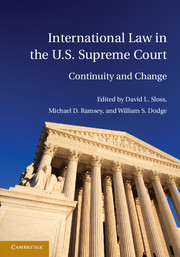Book contents
- Frontmatter
- Contents
- List of Contributors
- Table of Cases
- Acknowledgments
- Introduction
- PART I FROM THE FOUNDING TO THE CIVIL WAR
- PART II FROM THE CIVIL WAR TO THE TURN OF THE CENTURY
- PART III FROM THE TURN OF THE CENTURY TO WORLD WAR II
- PART IV FROM WORLD WAR II TO THE NEW MILLENNIUM
- PART V INTERNATIONAL LAW IN THE U.S. SUPREME COURT IN THE TWENTY-FIRST CENTURY
- Introductory Note
- V.A TREATIES AFTER 2000
- V.B CUSTOMARY INTERNATIONAL LAW AFTER 2000
- V.C INTERNATIONAL LAW AND CONSTITUTIONAL INTERPRETATION AFTER 2000
- V.D INTERNATIONAL LAW AND STATUTORY INTERPRETATION AFTER 2000
- V.E INTERNATIONAL LAW AND THE WAR ON TERROR
- VI CONCLUSION
- Index
Introductory Note
Published online by Cambridge University Press: 05 July 2011
- Frontmatter
- Contents
- List of Contributors
- Table of Cases
- Acknowledgments
- Introduction
- PART I FROM THE FOUNDING TO THE CIVIL WAR
- PART II FROM THE CIVIL WAR TO THE TURN OF THE CENTURY
- PART III FROM THE TURN OF THE CENTURY TO WORLD WAR II
- PART IV FROM WORLD WAR II TO THE NEW MILLENNIUM
- PART V INTERNATIONAL LAW IN THE U.S. SUPREME COURT IN THE TWENTY-FIRST CENTURY
- Introductory Note
- V.A TREATIES AFTER 2000
- V.B CUSTOMARY INTERNATIONAL LAW AFTER 2000
- V.C INTERNATIONAL LAW AND CONSTITUTIONAL INTERPRETATION AFTER 2000
- V.D INTERNATIONAL LAW AND STATUTORY INTERPRETATION AFTER 2000
- V.E INTERNATIONAL LAW AND THE WAR ON TERROR
- VI CONCLUSION
- Index
Summary
The first decade of the twenty-first century was a busy one for international law in the U.S. Supreme Court. The essays in Part V address the Court's most significant decisions during this period under five headings: (1) treaties, (2) customary international law, (3) constitutional interpretation, (4) statutory interpretation, and (5) the war on terror. Because these decisions are so recent, Part V addresses them differently – with shorter and more opinionated essays. This introductory note provides a brief overview of the decade's international cases under each of these headings. The essays that follow give more detailed accounts, opinions, and analyses regarding the leading cases.
Treaties after 2000
The Court most starkly confronted the role of treaties in two 2006 cases – Sanchez-Llamas v. Oregon and its companion case Bustillo v. Johnson – and in Medellin v. Texas two years later. All three cases involved individuals who were convicted of criminal offenses after state governments violated the provision of the Vienna Convention on Consular Relations (VCCR) mandating that foreign nationals arrested in the United States shall have the opportunity to speak with their nation's consulate. State law enforcement in the United States routinely failed to grant this right, a matter that first came to the Court at the end of the twentieth century in Breard v. Greene. But the significance of the issue escalated in 2004 when the International Court of Justice (ICJ) found, in the Avena case, that violations of the VCCR required defendants' sentences and convictions to be revisited and that procedural defaults under domestic law should not stand in the way.
- Type
- Chapter
- Information
- International Law in the U.S. Supreme Court , pp. 443 - 448Publisher: Cambridge University PressPrint publication year: 2011

